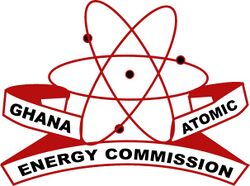Ghana Atomic Energy Commission
Topic: Organization
 From HandWiki - Reading time: 2 min
From HandWiki - Reading time: 2 min
 The GAEC flag | |
| Established | 1952 |
|---|---|
| Type | Organization |
| Legal status | Active |
| Headquarters | Republic of Ghana |
| Website | www.gaec.gov.gh |
The Ghana Atomic Energy Commission (GAEC) is the state organization in Ghana involved with surveillance of the use of nuclear energy in Ghana. It is similar in aim to the Ghana Nuclear Society (GNS), with the difference being that the GNS is a nonprofit organisation, whereas the GAEC is part of the parliament of Ghana. Its primary objectives were set out by the parliament act 588, which involve investigating the use of nuclear energy for Ghana and supporting research and development both in Ghana and abroad.[1]
History
Ghana Atomic Energy Commission (GAEC) was formed as way back as 1952 when radioisotopes began in Ghana. Around that time, radiostrontium was what used in experiments. In the year 1958, the Department of physics of the University College of the Gold Coast, which is now (University of Ghana, Legon) started a radioactive fallout monitoring service on behalf of the Defence Ministry. In the year 1961, work in radioisotopes in Ghana had gained grounds in most of the Government institutions to explain establishment of a Radioisotope Unit.[2]
Sub-Divisions
- National Nuclear Research Institute (NNRI):
- School of Nuclear and Allied Sciences (SNAS):
Responsible for preservation, maintenance and enhancement of nuclear knowledge in Ghana and Africa through the provision of high-quality teaching, research, entrepreneurship training, service and development of postgraduate programmes in the nuclear sciences and technology.
- Radiation Protection Institute (RPI):
Authorize, inspect and control all activities and practices involving sealed radiation sources, ionizing radiation and other sources, radioactive materials and x-rays used in hospitals in Ghana. Implementation of safety culture by providing adequate human resource development in radiation and waste safety for management and operating organizations. Conduct research and technical services in radiation and waste safety.
- Biotechnology and Nuclear Agriculture Research Institute (BNARI):
See also
- Nuclear power in Ghana
- Nuclear power by country
References
- ↑ Ghana Atomic Energy Commission (GAEC), http://www.gaecgh.org/, 17 June 2012
- ↑ https://gaec.gov.gh/history/
External links
- Council for Scientific and Industrial Research – Ghana
 |
 KSF
KSF